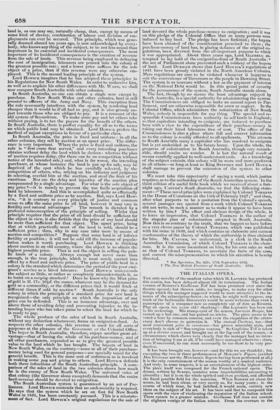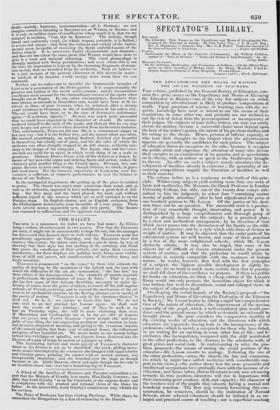THE ITALIAN OPERA.
THE only novelty of the smallest value which M. LAPORTE has produced this season, has been delayed almost till its termination. The Italian version of ROSSINI'S Guillaume Tell has been promised ever since the theatre opened ; but thrown aside, we imagine, to make way for other things which the manager supposed would be more attractive to the in- mates of the subscription-boxes ; to whom, he might well suppose, any trash of the fashionable Doxizorri would he more welcome than even a masterpiece of a composer now so completely out of date as ROSSINI. Play an opera ten years old ! shocking!—But I.AeonTE has been out in his reckoning. His trump-card of the season, Luerezia Borgia, has turned up a bad one, and has gained no tricks. The piece seems to be voted a bore by common consent, and even the cxquisites of the aristo- cracy don't choose to patronize it. The eternal Puritani, too—that most convenient pie?ce de resistance—has grown miserably stale, and everybody is sick of " Son vergine vezzosa." So G ugliehno Tell is taken up as a derider ressort, and brought out at the fag-end of the season,—a circumstance which shows very clearly that the manager had no inten- tion of bringing it out at all, if he could have managed otherwise ; since, even if successful, its run must necessarily be too short to be very pro- ductive.
It has been brought out, however—and for this we are thankful ; for, excepting the two or three performances of MozAwr's Figaro, (neither Don Gioranni nor the 411"«trimmilo Segreto having been performed at all,) it is the only entertainment of the season worthy of a musical audience. And truly, in some respects, it is an entertainment of the highest order. The piece itself was composed for the French national opera. The drama, written by SCRIBE, contains some improbabilities amounting to absurdity ; but it is on the whole spirited and even poetical, and afforded the finest possible field for the musician. When Rossm set about the music, he had been silent, or very nearly so, for many years ; in the course of which time, lie had imbibed, it would seem, entirely new ideas on the subject of his art. It has been said that he composed this opera with the view of vindicating the reputation of the Italian school. There cannot be a greater mistake. Guillaume Tell does not contain the slightest vestige of the Italian school. From the overture to the finale—melody', harmony, instrumentation—all is German ; we can imagine ourselves listening to BEETHOVEN, or WEBER, or SPOIIR ; and it is only on sudden starts of recollection whose music it is, that we are tempted to exclaim, "Can this be ROSSINI?" The melody, though broad and eminently vocal, (in which respect, certainly, it is Italian,) is severe and simple ; and, from the richness and variety of the instru- mental score, incapable of receiving the florid embellishments of the Italian singers. It is, moreover, highly characteristic and dramatic ; and RossiNi has taken the same pains that WiniEn would have done to give it a local and national colouring. The vocal phraseology is strongly marked with Swiss peculiarities ; and even where this is not the case, the impression is kept up by the charming fragments of moun- tain melody that are breathed from the orchestra. Such we believe to be a just account of the general character of this admirable music : an analysis of its beauties would occupy inure room than we can command. Neither can we endeavour to describe the innumerable beauties of LAni.acines personation of the Swiss patriot. It is unquestionably the greatest and noblest of his scenic achievements ; and its transcendant excellence must account for the extraordinary success of the opera when brought out at Naples. In any other circumstances, Rossna's Ger- man strains, so uncouth to Neapolitan ears, would have been as ill re- ceived as those of poor Jo3o.m when he returned, after a twenty years' residence in Germany, to chic of mortification in his native city. The cry would have been, as in the case of JOMELLI'S unfortunate opera—" E seelerata, signore !" RullINI was much more successful than we could have expected in the character of Arne/d. lie accom- modated himself to the style of the music, and showed that he can sing with beauty and power, even when debarred from his favourite roulades. This, unfortunately, PERSIAN' did not. She is a consummate singer in her own way—but it is the Italian way, and she cannot adopt any other. She insisted, accordingly, on making fiorituri, finished and beautiful in themselves, but wholly out of place, and tbr the sake of which the orchestra was often abruptly stopped in its full career, evidently con- trary to the design of the composer. Iler figure, also, and her voice, are both too small for an opera in which every thing is on a scale so grandiose. Madame DORUS GaAs, with all her defects as a singer, by means of her powerful organ and striking figure and action, makes the character quite another thing at the French opera. DUPREZ, too, sur- passes licenn in force and energy, though inferior, we think, in grace and tenderness. But the immense superiority of LAmaemin over LE- VASSEUR is sufficient, as respects performance, to cast the balance in favour of our Italians.
In the managerial department, the getting-up of the piece is entitled to praise. The chorus was much more numerous than usual, and, as well as the orchestra, appeared to have undergone a good deal of dril- ling. But they sang, and the band played, too loud, and without sufficient regard to the 1111(111Ce8 which are so well attended to on the Parisian stage. An English chorus, and an English orchestra, from the Philharmonic downwards, seem incapable of a true piano. There were several scenes apparently new, and very pretty. The theatre was crammed to suiTheation, and the applause was tumultuous.



























 Previous page
Previous page